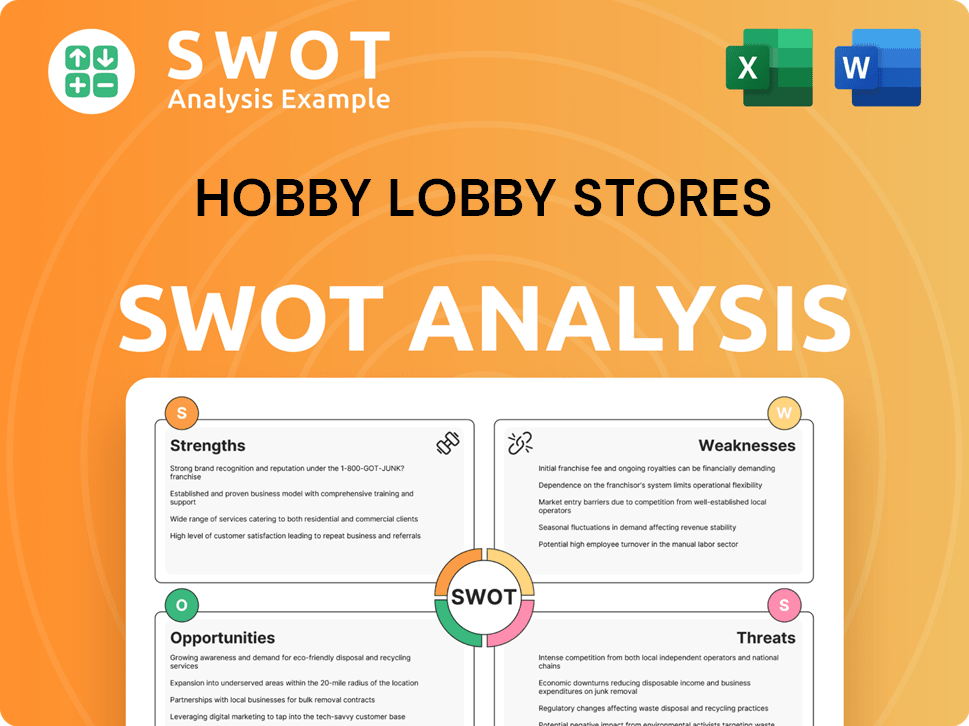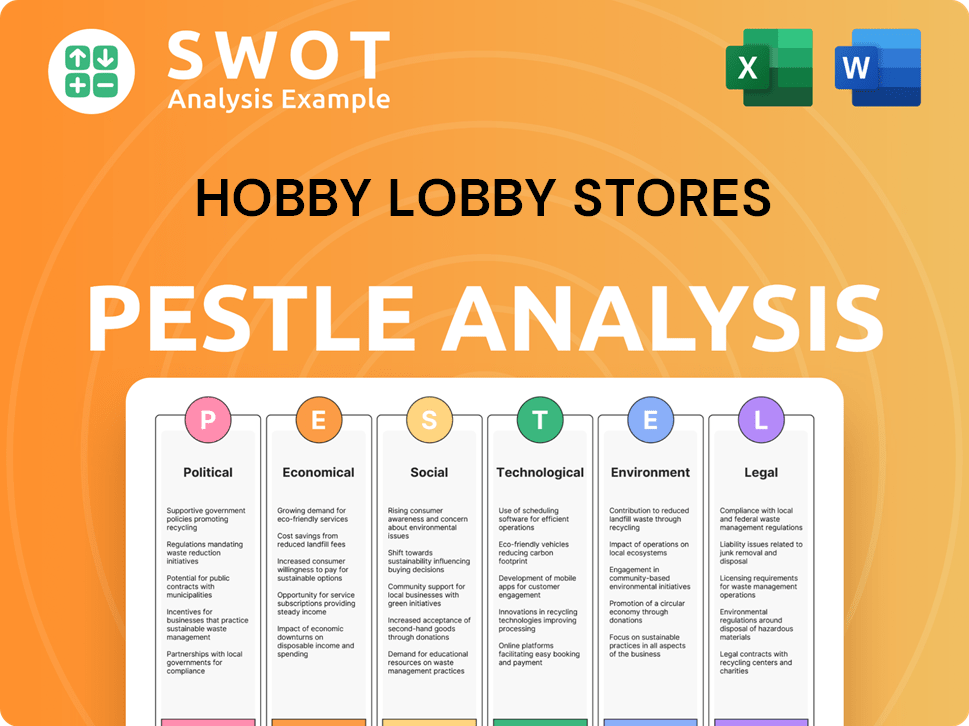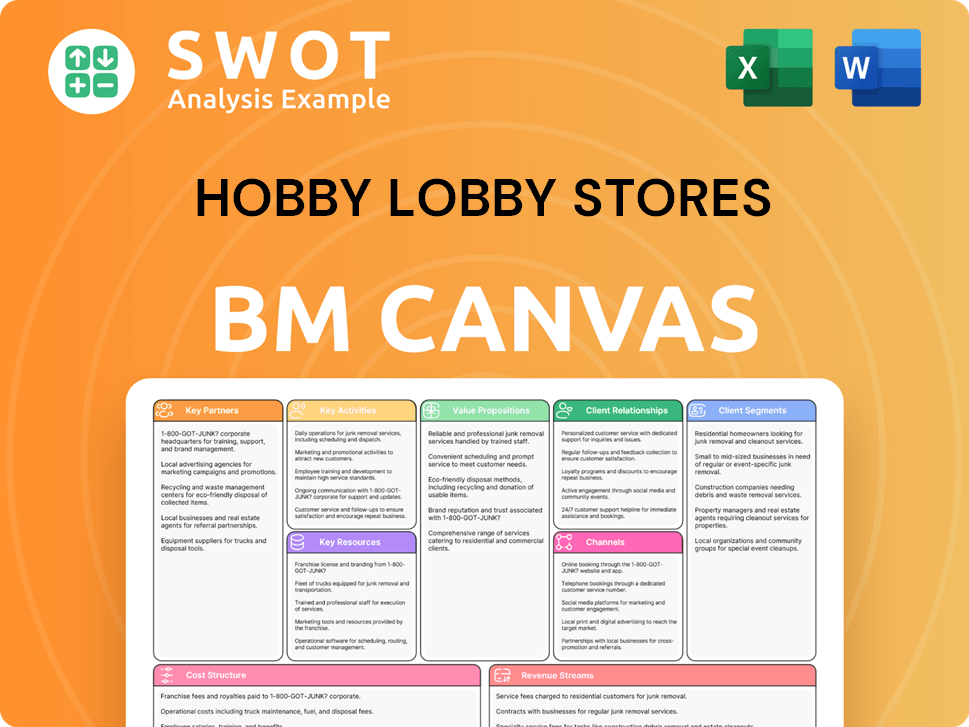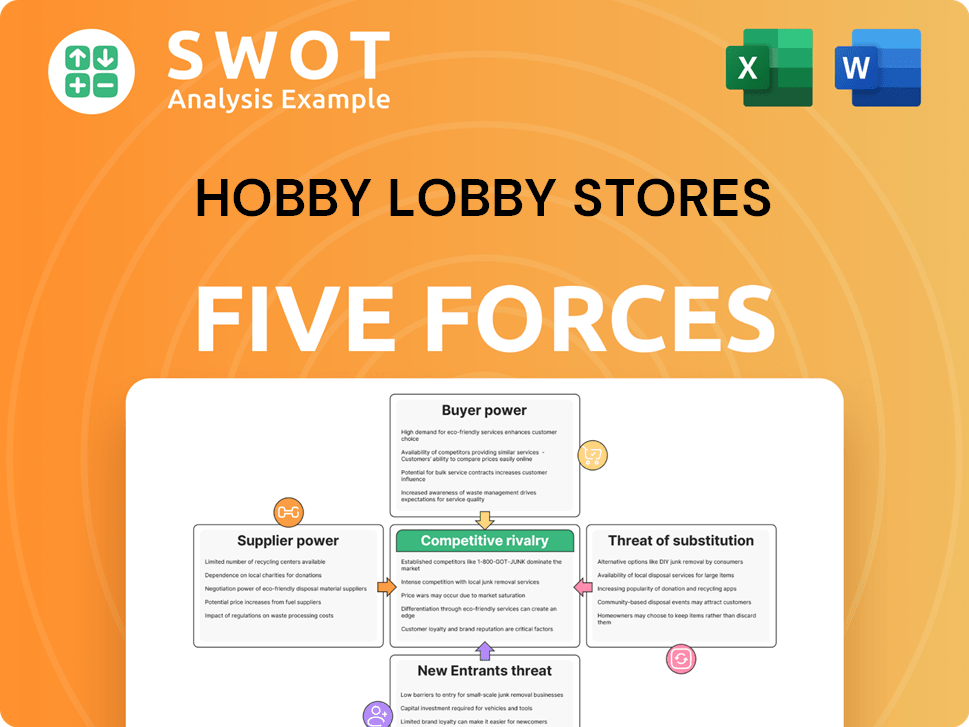Hobby Lobby Stores Bundle
What Drives Hobby Lobby's Success?
Every successful company has a guiding star. Understanding a company's mission, vision, and core values is crucial for investors, analysts, and anyone seeking to understand its trajectory. This exploration delves into the heart of Hobby Lobby, revealing the principles that shape its identity and influence its operations.

Founded in 1972, Hobby Lobby has become a retail giant, but what principles underpin its massive success? This analysis unpacks Hobby Lobby's mission statement, vision statement, and core values to understand its business philosophy and how it aligns with its goals. Discover the Hobby Lobby Stores SWOT Analysis and gain insights into Hobby Lobby's commitment to faith, ethical standards, and its unique company culture.
Key Takeaways
- Hobby Lobby's mission, vision, and values are central to its market success.
- Customer value, employee well-being, and faith-based principles are key strengths.
- These principles contribute to customer loyalty and employee retention.
- Alignment with core values supports future growth and expansion.
- Hobby Lobby's purpose, even faith-based, shapes its distinctiveness.
Mission: What is Hobby Lobby Stores Mission Statement?
Hobby Lobby's mission is 'Offering customers exceptional selection and value. Serving our employees and their families by establishing a work environment and company policies that build character, strengthen individuals and nurture families.'
Let's delve into the heart of Hobby Lobby's operations by examining its mission statement. Understanding the Hobby Lobby mission is crucial for grasping the company's core principles and how it aims to achieve its Hobby Lobby goals.
This is the cornerstone of Hobby Lobby's customer-centric approach. The company strives to provide a wide array of products, catering to diverse creative interests. This commitment to offering value is often reflected in their pricing strategies, including frequent sales and discounts, which contribute to their competitive edge in the market.
Hobby Lobby places a strong emphasis on its employees. This is demonstrated through policies like closing stores on Sundays, allowing employees time for family and religious observance. Additionally, the company is known for offering competitive wages and benefits, fostering a supportive work environment.
The mission statement reflects the company's commitment to values rooted in faith and family. This is evident in their operational decisions, such as store closures on Sundays, and their overall approach to employee relations. These Hobby Lobby beliefs shape the company's culture.
Hobby Lobby's primary market is the United States, with over 1,000 stores across 48 states as of late 2024. This extensive network allows the company to reach a broad customer base and maintain a significant presence in the arts and crafts retail sector. The company's growth has been steady, reflecting its successful business model.
The Hobby Lobby company translates its mission into action through various operational strategies. These include curating an extensive product range, implementing value-driven pricing, and prioritizing employee well-being. These actions are key to understanding how Hobby Lobby operates.
The mission statement highlights a dual focus: customer satisfaction and employee well-being. This balanced approach is a key aspect of the company's identity. This dual focus influences Hobby Lobby's ethical standards and its approach to Hobby Lobby's corporate social responsibility.
The Hobby Lobby vision is intrinsically linked to its mission. The mission statement provides a clear picture of the company's commitment to both its customers and its employees. To gain a deeper understanding of the company, you can learn more about its origins by reading a Brief History of Hobby Lobby Stores. Understanding Hobby Lobby's core values and Hobby Lobby's guiding principles provides further insight into how the company operates and its long-term objectives. The mission statement serves as a foundation for the company's strategic decisions and its overall business philosophy.
Hobby Lobby Stores SWOT Analysis
- Complete SWOT Breakdown
- Fully Customizable
- Editable in Excel & Word
- Professional Formatting
- Investor-Ready Format

Vision: What is Hobby Lobby Stores Vision Statement?
While a concise, formal vision statement isn't readily available, Hobby Lobby's vision can be understood as: "To be the leading destination for arts and crafts, fostering creativity and providing exceptional value while operating with unwavering faith-based principles, ensuring long-term sustainability and continued expansion."
Delving into the Hobby Lobby vision, we can extrapolate a future-oriented perspective based on the company's actions and stated values. This vision is not just about immediate profits, but about building a lasting legacy in the arts and crafts retail sector. It's about creating a space where creativity thrives, and customers find inspiration and resources for their artistic endeavors. The Hobby Lobby company is committed to growth and market dominance.
The ongoing expansion, with new stores planned and opened even in 2025, signals a vision of continued growth. Hobby Lobby aims to maintain its position as a leading retailer in the arts and crafts market. This expansion strategy is a key component of their long-term vision.
Hobby Lobby's vision includes fostering a strong sense of community among its customers. This involves providing a wide selection of products and creating an environment that encourages creativity and artistic expression. This customer-centric approach is central to their goals.
The company's vision extends beyond short-term profitability. Hobby Lobby aims for long-term financial sustainability. This involves prudent financial management and strategic investments to ensure continued growth and resilience in the market. The Hobby Lobby goals are centered around long-term viability.
A significant aspect of Hobby Lobby's vision is operating in accordance with its Hobby Lobby beliefs and faith-based values. This influences decisions regarding business practices, employee relations, and community involvement. The Hobby Lobby core values are deeply intertwined with this aspect.
The vision also encompasses adaptability and innovation to meet changing market demands. Hobby Lobby is likely to embrace new technologies and trends to enhance the customer experience and maintain its competitive edge. This includes digital initiatives and evolving product offerings.
Hobby Lobby's vision includes a commitment to its employees and other stakeholders. This involves creating a positive work environment, providing fair wages, and contributing to the well-being of the communities it serves. This is a key aspect of their Hobby Lobby's company values.
The absence of a formal, readily available Hobby Lobby vision statement explained necessitates an analysis of the company's actions to understand its future orientation. Hobby Lobby's commitment to expansion, its focus on providing a broad selection of products, and its emphasis on community all offer clues. The Hobby Lobby's business philosophy is also reflected in its commitment to its faith-based principles. This commitment influences various aspects of its operations, from employee relations to its stance on social issues. The Hobby Lobby's ethical standards are also a crucial part of their vision.
The privately owned nature of the company allows for a long-term perspective, focusing on sustainability and enduring success rather than solely on quarterly profits. The company's financial performance, with substantial annual revenue (estimated at over $7 billion in recent years), supports its ability to pursue this vision. For more insight on how Hobby Lobby approaches its market, consider reading about the Marketing Strategy of Hobby Lobby Stores.
In conclusion, while a formal vision statement may not be readily available, the Hobby Lobby's long-term vision appears to be one of continued market dominance, sustained growth, and adherence to its core values. This vision is supported by its financial strength, its commitment to its customers, and its unique approach to business. Understanding the Hobby Lobby's guiding principles is key to understanding its vision. The Hobby Lobby core values and principles are central to the company's identity and future direction. The Hobby Lobby's commitment to faith is a defining characteristic of its vision.
Hobby Lobby Stores PESTLE Analysis
- Covers All 6 PESTLE Categories
- No Research Needed – Save Hours of Work
- Built by Experts, Trusted by Consultants
- Instant Download, Ready to Use
- 100% Editable, Fully Customizable

Values: What is Hobby Lobby Stores Core Values Statement?
Understanding the core values of Hobby Lobby is crucial to grasping its unique business model and corporate identity. These values, deeply rooted in the Christian faith of its founders, shape every aspect of the company, from its operational decisions to its employee relations.
This is the foundational value, influencing major decisions such as Sunday closures and stances on social issues. It’s about integrating faith into business practices, shaping the corporate culture to reflect Christian teachings. This commitment is prominently displayed on the Hobby Lobby website and in its business practices, differentiating it from competitors.
This value drives product development and business practices, focusing on providing a wide array of arts and crafts supplies and home decor at competitive prices. Hobby Lobby achieves this through its large store formats, frequent sales events, and strategic sourcing. The company's success in this area is reflected in its consistent revenue growth, with sales reaching approximately $6.3 billion in 2023.
This value is evident in employee relations through benefits, competitive wages, and policies like Sunday closures. Hobby Lobby aims to cultivate a supportive culture that prioritizes employee well-being. A significant example is the company’s recent increase in minimum wage to $19.25, effective October 1, 2024, demonstrating its commitment to its employees.
This value emphasizes financial stewardship, sharing success with employees through compensation and benefits, and engaging in philanthropic activities and community support. Hobby Lobby's commitment to this value is reflected in its contributions to various charitable causes and its focus on creating a positive impact beyond its business operations. The company's approach to corporate social responsibility aligns with its overall target market and values.
These core values of Hobby Lobby, which define its business philosophy, create a unique corporate identity that resonates with customers and employees who share similar beliefs. Understanding these principles provides a deeper insight into how the company operates and makes decisions. Next, we will explore how the Hobby Lobby mission and vision influence the company's strategic decisions.
How Mission & Vision Influence Hobby Lobby Stores Business?
The deeply ingrained Hobby Lobby mission and unwavering Hobby Lobby core values serve as the bedrock upon which the company's strategic decisions are built. These principles guide every aspect of the business, from product selection to employee relations, significantly influencing its operational approach and long-term objectives.
The Hobby Lobby mission of providing exceptional selection and value directly shapes its merchandising strategy. This translates into expansive store layouts, offering a vast array of products to cater to diverse customer interests. Frequent discounts and sales are a hallmark of the company's approach, aimed at delivering value and attracting customers.
- Large store formats with extensive product lines.
- Emphasis on competitive pricing and frequent promotional events.
- Focus on offering a wide variety of craft and home décor items.
- Continuous efforts to enhance the customer shopping experience.
Hobby Lobby beliefs have a profound impact on strategic decisions. The commitment to honoring their faith is evident in practices like closing on Sundays, which, despite potentially sacrificing a significant retail day, aligns with their core principles. This commitment also influenced their stance on legal challenges related to healthcare mandates, reflecting a dedication to their values.
The company's focus on its employees influences compensation and benefits strategies. Recent minimum wage increases, for example, demonstrate a commitment to serving its workforce. This approach, while impacting operational costs, aligns with the Hobby Lobby core values of treating employees fairly and valuing their contributions.
The value of investing in the community is reflected in philanthropic partnerships and support for various causes. This commitment to corporate social responsibility underscores the company's dedication to making a positive impact beyond its business operations. This is a key component of Hobby Lobby's business philosophy.
These guiding principles shape day-to-day operations, from store hours to employee interactions, and inform long-term planning regarding expansion and resource allocation. The Hobby Lobby's company values are integral to the company's culture and operational framework. They are the foundation of Hobby Lobby's ethical standards.
While specific measurable success metrics directly tied to the mission and values in isolation are not readily available, the company's consistent revenue growth and expansion suggest that their values-driven approach has contributed to their overall success. David Green, the founder, has emphasized operating the company consistent with Biblical principles. You can find more information about this in Mission, Vision & Core Values of Hobby Lobby Stores.
The Hobby Lobby mission statement and Hobby Lobby vision statement explained are not just words; they are the very essence of how the company operates. They dictate how Hobby Lobby operates, influencing every facet of the business. Understanding these principles provides insight into Hobby Lobby's guiding principles and its commitment to its values.
The consistent application of the Hobby Lobby core values and principles has been instrumental in shaping the company's culture, influencing its strategic decisions, and contributing to its sustained success. Explore the next chapter to understand the Hobby Lobby's long-term vision and its core improvements.
Hobby Lobby Stores Business Model Canvas
- Complete 9-Block Business Model Canvas
- Effortlessly Communicate Your Business Strategy
- Investor-Ready BMC Format
- 100% Editable and Customizable
- Clear and Structured Layout

What Are Mission & Vision Improvements?
While Hobby Lobby's mission and values have served it well, continuous improvement is key to staying relevant in a changing world. These refinements can help the company better align with evolving consumer expectations and market trends.
One area for improvement is explicitly incorporating a commitment to sustainability into the company's mission or values. This could involve addressing environmental concerns related to retail operations, product sourcing, and waste management, reflecting a growing consumer preference for eco-conscious brands. This is especially important as consumers, particularly Millennials and Gen Z, increasingly prioritize sustainability when making purchasing decisions. According to a 2024 study by NielsenIQ, 73% of global consumers would change their consumption habits to reduce their environmental impact.
Another opportunity lies in more clearly articulating how Hobby Lobby's values translate into diversity and inclusion efforts. This could involve explicitly stating a commitment to creating a welcoming environment for all customers and employees, regardless of their backgrounds. This is crucial, as companies with diverse teams often outperform those that are not. A McKinsey report from 2023 found that companies in the top quartile for gender diversity on executive teams were 25% more likely to experience above-average profitability, showcasing how embracing diversity can drive business success.
As technology and e-commerce continue to evolve, refining the Hobby Lobby vision to explicitly address its digital strategy is beneficial. This could involve outlining how the company plans to leverage technology to enhance the customer experience, expand its reach, and adapt to changing consumer behaviors. In 2024, e-commerce sales are projected to account for 21% of total retail sales in the US, emphasizing the importance of a robust digital presence. This is a crucial aspect of the Owners & Shareholders of Hobby Lobby Stores long-term vision.
While Hobby Lobby is known for its philanthropic efforts, formalizing and expanding its community engagement initiatives could further enhance its brand reputation. This could involve increasing support for local communities, partnering with charitable organizations, and promoting employee volunteerism. According to a 2024 study by Giving USA, charitable giving in the US reached $499.3 billion in 2022, demonstrating the importance of corporate social responsibility and community involvement.
How Does Hobby Lobby Stores Implement Corporate Strategy?
Implementing a company's mission, vision, and core values is crucial for aligning actions with stated principles. This implementation ensures that the company's operations reflect its core beliefs and goals, fostering a cohesive culture and consistent stakeholder experience.
Hobby Lobby's commitment to its Hobby Lobby mission, vision, and core values is most visibly demonstrated through its operational decisions. These decisions are a direct reflection of the company's commitment to its guiding principles.
- Sunday Closures: The consistent closure of all Hobby Lobby stores on Sundays is a clear example of honoring the Lord, allowing employees time for rest, worship, and family. This practice, a direct reflection of the company's core values, has been in place since the company's inception.
- Leadership's Role: Founder David Green and President Steve Green play a crucial role in reinforcing the company's mission and values. Their public messaging and personal adherence to these principles serve as a constant reminder of the company's commitment.
Hobby Lobby communicates its mission, vision, and core values to stakeholders through various channels. This ensures that employees, customers, and the broader community understand the company's beliefs and goals.
The company's website, in-store signage, and employee training programs are key communication tools. These platforms consistently reinforce the company's core values and mission.
Hobby Lobby demonstrates its commitment to its Hobby Lobby core values through tangible actions. These actions reflect the company's dedication to its mission.
- Employee Benefits: Offering competitive wages and benefits aligns with the value of serving employees.
- Product Selection and Value: The wide product selection and frequent sales support the value of offering exceptional selection and value to customers.
While specific details on formal programs are not extensively publicized, the consistent application of policies indicates a systematic approach. This approach ensures that the company's values are embedded in its operations. The company's philanthropic activities also demonstrate a commitment to investing in the community.
Hobby Lobby Stores Porter's Five Forces Analysis
- Covers All 5 Competitive Forces in Detail
- Structured for Consultants, Students, and Founders
- 100% Editable in Microsoft Word & Excel
- Instant Digital Download – Use Immediately
- Compatible with Mac & PC – Fully Unlocked

Related Blogs
- What are Mission Vision & Core Values of Hobby Lobby Stores Company?
- What is Competitive Landscape of Hobby Lobby Stores Company?
- What is Growth Strategy and Future Prospects of Hobby Lobby Stores Company?
- How Does Hobby Lobby Stores Company Work?
- What is Sales and Marketing Strategy of Hobby Lobby Stores Company?
- Who Owns Hobby Lobby Stores Company?
- What is Customer Demographics and Target Market of Hobby Lobby Stores Company?
Disclaimer
All information, articles, and product details provided on this website are for general informational and educational purposes only. We do not claim any ownership over, nor do we intend to infringe upon, any trademarks, copyrights, logos, brand names, or other intellectual property mentioned or depicted on this site. Such intellectual property remains the property of its respective owners, and any references here are made solely for identification or informational purposes, without implying any affiliation, endorsement, or partnership.
We make no representations or warranties, express or implied, regarding the accuracy, completeness, or suitability of any content or products presented. Nothing on this website should be construed as legal, tax, investment, financial, medical, or other professional advice. In addition, no part of this site—including articles or product references—constitutes a solicitation, recommendation, endorsement, advertisement, or offer to buy or sell any securities, franchises, or other financial instruments, particularly in jurisdictions where such activity would be unlawful.
All content is of a general nature and may not address the specific circumstances of any individual or entity. It is not a substitute for professional advice or services. Any actions you take based on the information provided here are strictly at your own risk. You accept full responsibility for any decisions or outcomes arising from your use of this website and agree to release us from any liability in connection with your use of, or reliance upon, the content or products found herein.